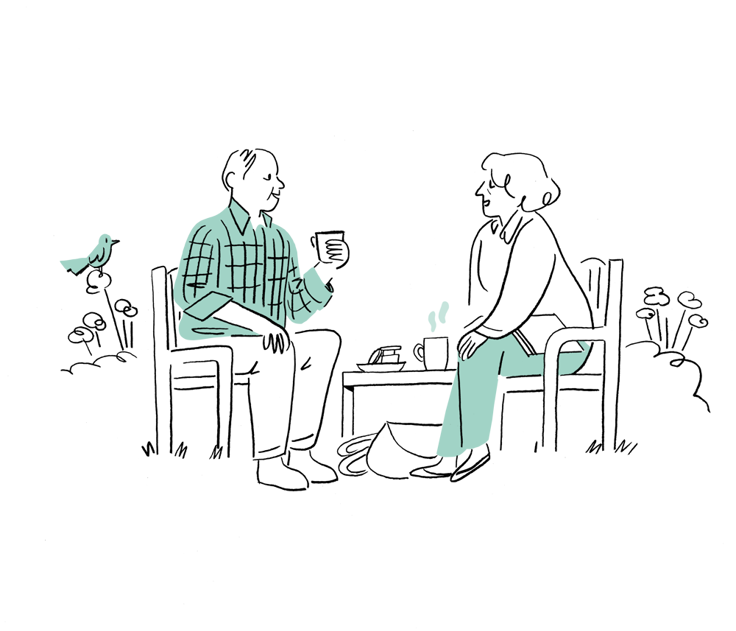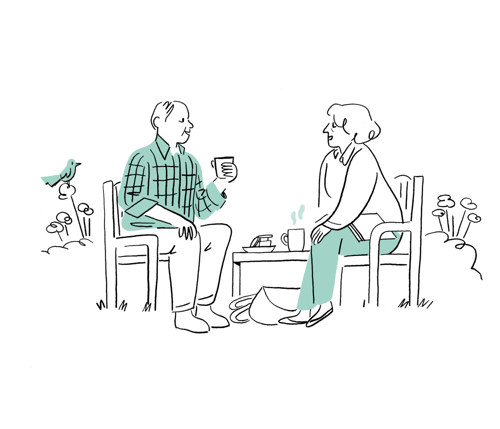Vaccine recommendations for influenza season 2024-2025
Article
|Updated
Almost 1.6 million people in Norway belong to groups with an increased risk of complications from influenza. They are recommended to take the seasonal influenza vaccine.
Influenza (also known as the flu) can lead to pneumonia, stroke and worsening of chronic underlying diseases. Admission to hospital may be necessary for severe complications from influenza. It is estimated that an average of 900 people die in Norway each year as a result of the disease. In some years, as many as 2,000 people could die from influenza. The influenza vaccine can save many of these lives.
Groups recommended to take the influenza vaccine
The influenza vaccine is especially recommended for:
- Residents in care homes and nursing homes
- Everyone from the age of 65 years
- Pregnant women in their 2nd and 3rd trimester, and pregnant women in the 1st trimester with other additional risk factors
- Premature babies, especially babies born before week 32 of pregnancy, from 6 months (chronological age) to 5 years
- Children and adults with:
- chronic lung disease (including asthma),
- cardiovascular disease (other than well-regulated high blood pressure)
- type 1 or type 2 diabetes
- liver failure or renal failure
- chronic neurological disease or injury
- impaired immune function due to disease or treatment (e.g. organ transplant, cancer, HIV, rheumatoid arthritis and other diseases)
- morbid obesity (BMI over 40)
- other serious or chronic diseases where influenza is a serious health risk, after individual assessment by a doctor (e.g. people with congenital chromosomal abnormalities, genetic syndromes and complex chromosomal abnormalities not classified elsewhere)
In addition, the influenza vaccine is recommended for:
- Healthcare personnel and other employees in the health and care service who have close contact with patients during treatment or care
- People who live with (or are equivalently close to) people who are immunosuppressed
- Pig breeders and others who have regular contact with live pigs.
- Sanitation workers and other personnel who handle domesticated birds with suspected or confirmed avian influenza as part of their job.
Can prevent serious illness
The elderly and people with chronic diseases are more likely to become seriously ill from influenza than the rest of the population. Pneumonia is a common complication. With severe influenza, organ failure and the need for respiratory assistance may require admission to hospital, and possibly intensive care.
People with cardiovascular disease are more susceptible to heart attacks and strokes during the influenza season. Influenza can also make it difficult to control blood sugar for diabetic patients and lead to deterioration in asthma patients and others with impaired lung function.
Following influenza, some may experience a worsening of existing chronic diseases. Some people also experience long-term deterioration in health after a serious disease course, and their need for help may increase so much that they can no longer live at home.
The influenza vaccine can prevent a severe influenza disease course and protect against long-term health consequences and permanently impaired health.
About the seasonal influenza vaccine 2024/25
The seasonal influenza vaccines contain three or four different influenza viruses - two A strains and one or two B strains. Influenza vaccines differ from others vaccines in that they must be adapted to the mutations in the virus and therefore change from year to year.
The effect of the influenza vaccine varies from year to year, but is on average about 60 per cent. This means that approximately 6 out of 10 of those vaccinated are protected against influenza. The effect depends on the characteristics of the virus, the vaccine and those who are vaccinated. Some people get influenza despite being vaccinated, but it seems that the vaccine can reduce the risk of a serious disease course.
Inactivated influenza vaccines
Inactivated influenza vaccines are non-live vaccines for injection, which contain virus parts or purified virus components from four influenza viruses (quadrivalent). The lower age limit is 6 months and there is no upper age limit.
Inactivated high-dose influenza vaccine for people over 60 years old contains four times the amount of antigen as the traditional seasonal vaccines. It will not be a part of the influenza vaccination program this season, but will be available in pharmacies.
Adjuvanted inactivated influenza vaccine
Adjuvanted inactivated influenza vaccine is a non-live vaccine for injection, which contains purified virus components from four influenza viruses (tetravalent). In addition, it contains an adjuvant, which is a substance that boosts the effect of the vaccine by increasing the immune response in the body. The vaccine is intended for people with weakened immune systems and this season is available to residents in nursing homes and people on the waiting list for such housing. The lower age limit is 50 years.
Live attenuated influenza vaccine
Live attenuated (attenuated) influenza vaccine (LAIV) contains three types of cold-adapted, temperature-sensitive, attenuated influenza virus (trivalent) and is administered in the form of nasal spray. LAIV has a lower age limit of 2 years and an upper age limit of 17 years. Since the vaccine is live, it should not be used by people with clinical immunosuppression or by pregnant women.
Composition of the seasonal vaccine
The World Health Organization (WHO) has established a network of national influenza centres to monitor influenza activity and recommend the composition of next season's vaccine. The Norwegian Influenza Centre (NIC Norway), located at the Norwegian Institute of Public Health, contributes to this work every year.
For season 2024/2025, the quadrivalent influenza vaccine (inactivated and adjuvanted vaccine) for the northern hemisphere contains these viruses, according to WHO’s recommendation:
- an A / Victoria / 2570/2022 (H1N1) pdm09-like virus
- an A/Thailand/8/2022 (H3N2)-like virus
- a B/Austria/1359417/2021 (B/Victoria lineage)-like virus and
- a B / Phuket / 3073/2013 (B / Yamagata lineage)-like virus.
The trivalent vaccine (live attenuated nasal vaccine) contains the top three viruses.
Registration in Norwegian Immunisation Registry SYSVAK
Influenza vaccination shall be notified to SYSVAK. If the person who is vaccinated logs into the vaccine service at helsenorge.no, they can see their vaccinations listed there.
- Vaccines – (helsenorge.no)

